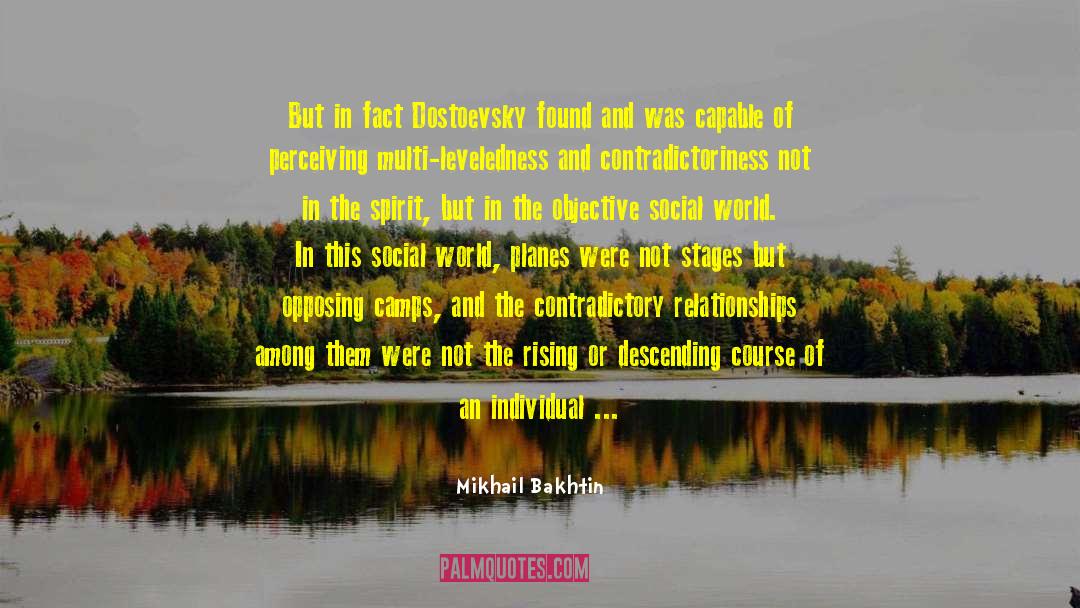Mikhail Bakhtin Famous Quotes
Reading Mikhail Bakhtin quotes, download and share images of famous quotes by Mikhail Bakhtin. Righ click to see or save pictures of Mikhail Bakhtin quotes that you can use as your wallpaper for free.
A newly born genre never supplants or replaces any already existing genres. Each new genre merely supplements the old ones, merely widens the circle of already existing genres. For every genre has its own predominant sphere of existence, in which it is irreplaceable. Thus the appearance of the polyphonic novel does not nullify or in any way restrict the further productive development of monologic forms of the novel (biographical, historical, the novel of everyday life, the novel-epic, etc.), for there will always continue to exist and expand those spheres of existence, of man and nature, which require precisely objectified and finalizing, that is monological, forms of artistic cognition. But again we repeat: the thinking human consciousness and the dialogic sphere in which this consciousness exists, in all its depth and specificity, cannot be reached through a monologic artistic approach.
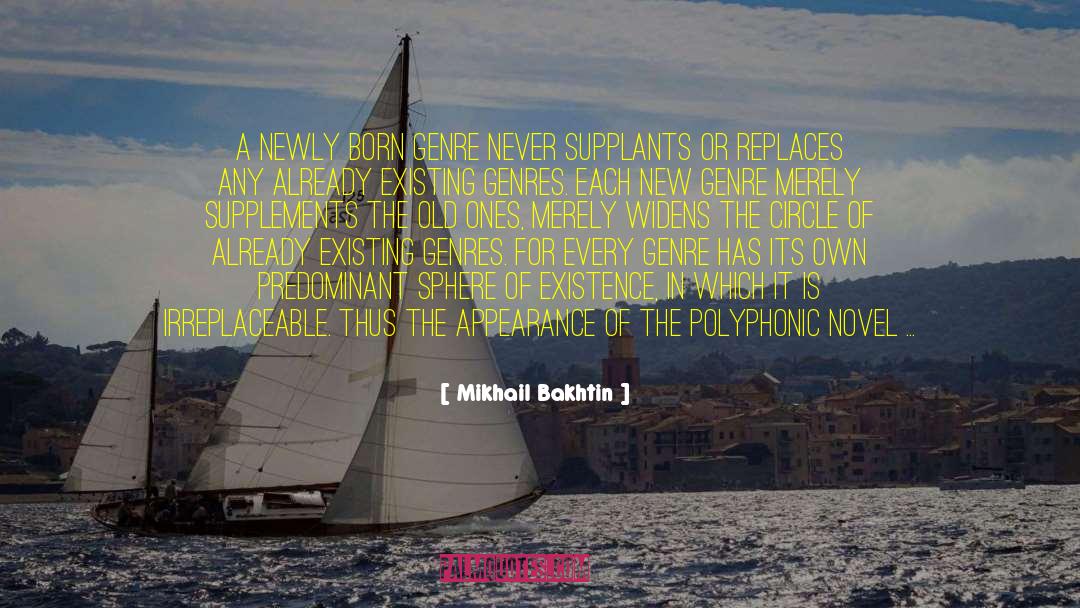
In order to understand, it is immensely important for the person who understands to be located outside the object of his or her creative understanding - in time, in space, in culture. For one cannot even really see one's own exterior and comprehend it as a whole, and no mirrors or photographs can help; our real exterior can be seen and understood only by other people, because they are located outside us in space, and because they are others.
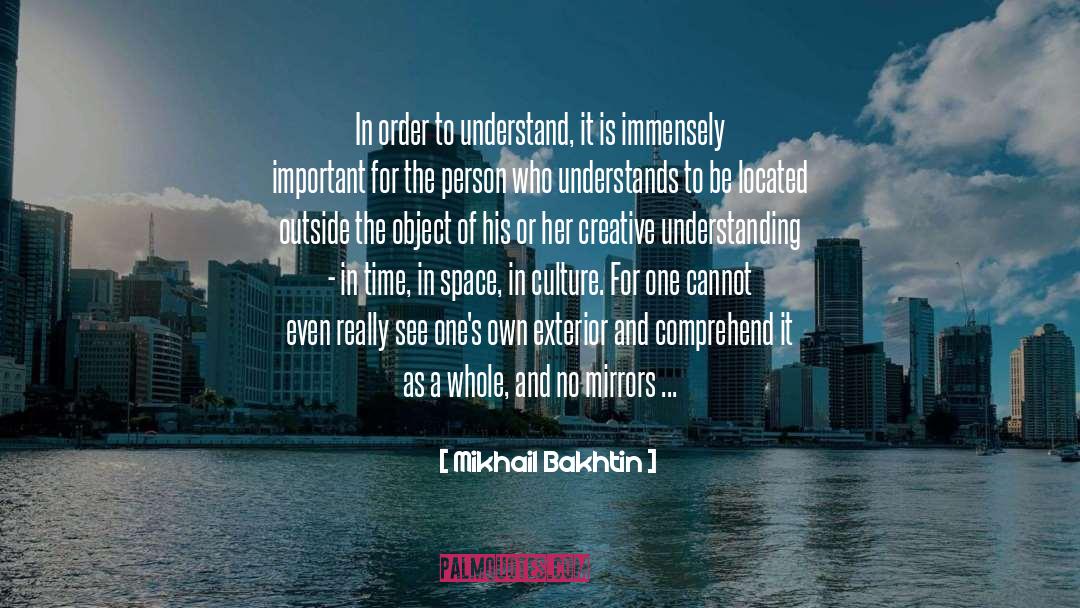
A third characteristic is the deliberate multi-styled and heterovoiced nature of all these genres. They reject the stylistic unity (or better, the single-styled nature) of the epic, the tragedy, high rhetoric, the lyric.
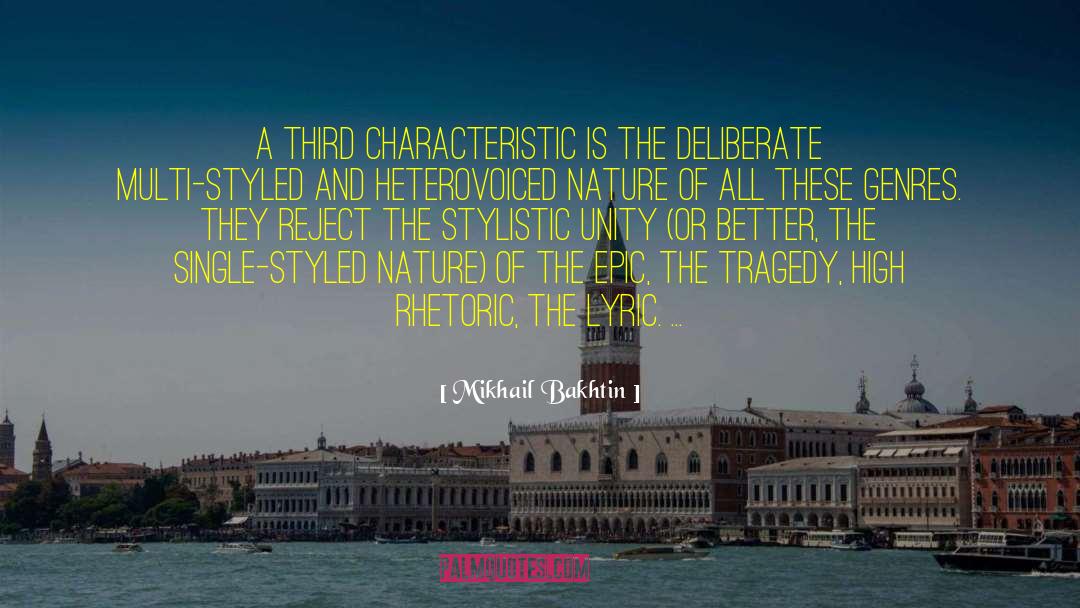
To a greater or lesser extent, every novel is a dialogized system made up of the images of "languages," styles and consciousnesses that are concrete and inseparable from language. Language in the novel not only represents, but itself serves as the object of representation.
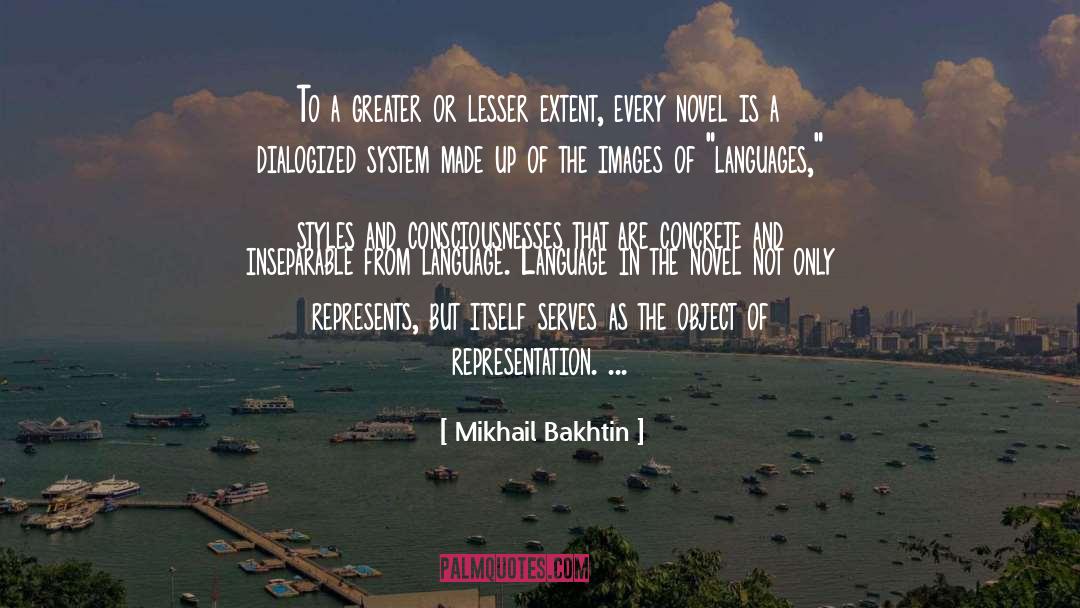
Dostoevsky's authorial activity is evident in his extension of every contending point of view to its maximal force and depth, to the outside limits of plausibility. He strives to expose and develop all the semantic possibilities embedded in a given point of view (Chernyshevsky, as we have seen, strove for the same thing in his Pearl of Creation). This Dostoevsky knew how to do with extraordinary power. And this activity, the intensifying of someone else's thought, is possible only on the basis of a dialogic relationship to that other consciousness, that other point of view. We

14. Finally, the last characteristic of the menippea: its concern with current and topical issues. This is, in its own way, the "journalistic" genre of antiquity, acutely echoing the ideological issues of the day.
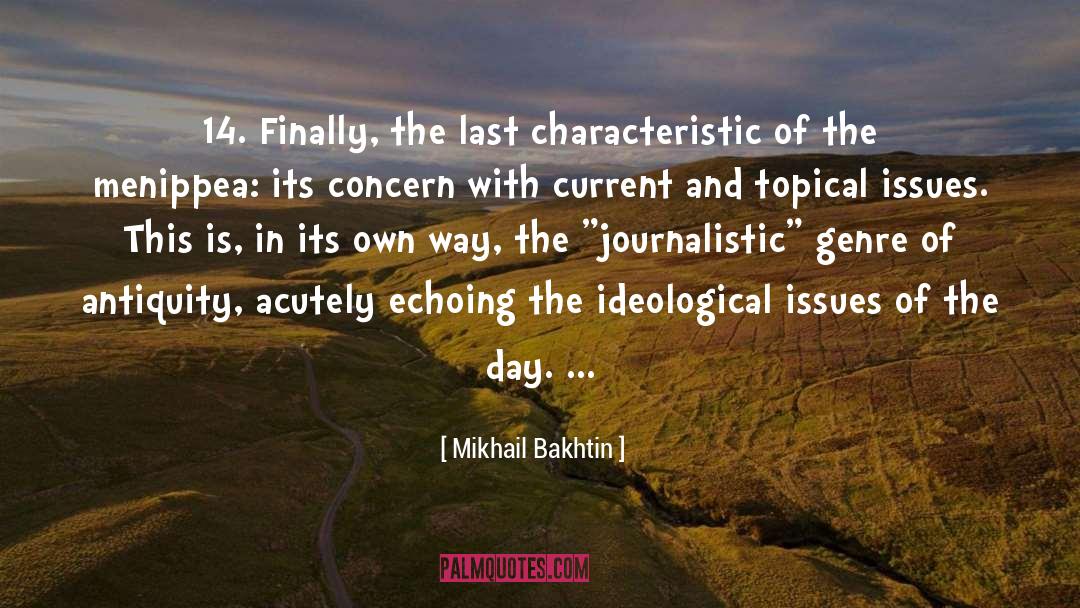
In rhetoric there are the unconditionally right and the unconditionally guilty; there is total victory and the annihilation of the opponent. In dialogue, annihilation of the opponent also annihilates the very dialogic sphere in which discourse lives... This sphere is very fragile and is easily destroyed...
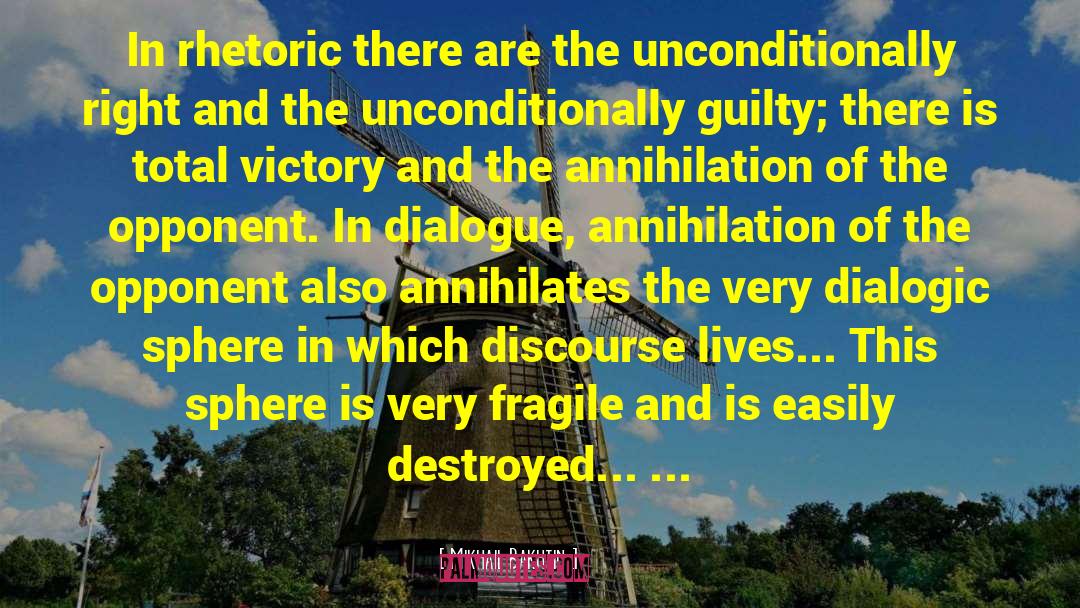
Especially in the Christian cult (wine and bread on the altar-tomb as the mystical body of Him Who Was Crucified, Who died and Who
was resurrected; the sacrament of new life and resurrection through food and drink). In the cultic redaction all elements of the complex appear not in a real but in a sublimated form, and are linked with one another not via a real-life narrative, but through mystic-symbolic links and interrelationships, and the triumph of life over death (resurrection) is accomplished not on a real and earthly plane but on a mystical one.
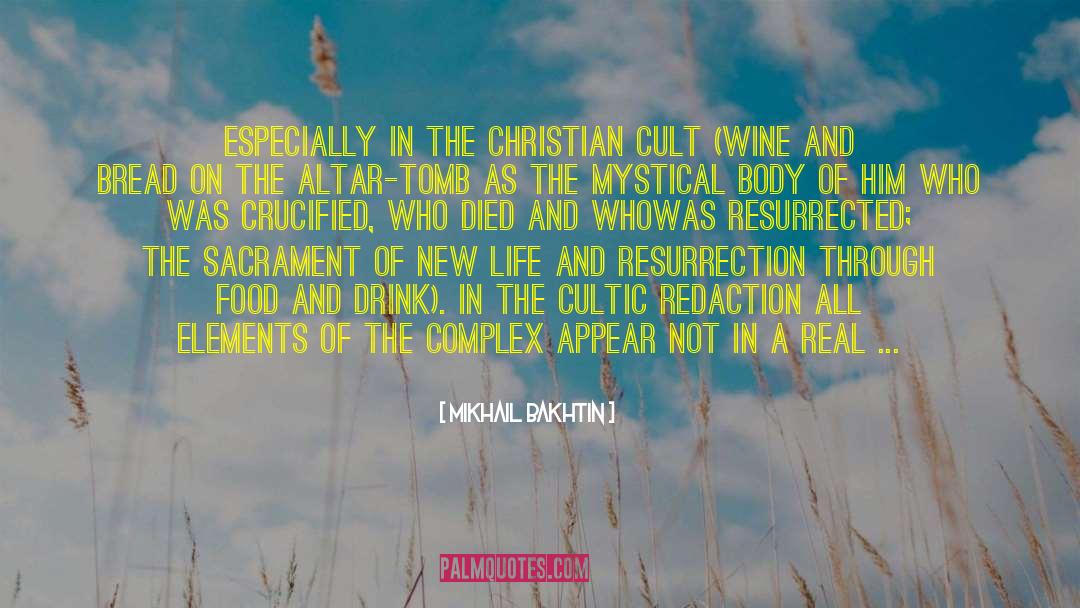
The primary carnivalistic act is the mock crowning and subsequent decrowning of the carnival king.

Laughter has the remarkable power of making an object come up close, of drawing it into a zone of crude contact where one can finger it familiarly on all sides, turn it upside down, inside out, peer at it from above and below, break open its external shell, look into its center, doubt it, take it apart, dismember it, lay it bare and expose it, examine it freely and experiment with it. Laughter demolishes fear and piety before an object, before a world, making of it an object of familiar contact and thus clearing the ground for an absolutely free investigation of it. Laughter is a vital factor in laying down that prerequisite for fearlessness without which it would be impossible to approach the world realistically.

Language, for the individual consciousness, lies on the borderline between oneself and the other. The word in language is half someone else's. It becomes 'one's owns' only when the speaker populates it with his own intention, his own accent, when he appropriates the word, adapting it to his own semantic and expressive intention. Prior to this moment of appropriation, the word does not exist in a natural and impersonal language (it is not, after all, out of a dictionary that the speaker gets his words!), but rather it exists in other people's mouths, in other people's contexts, serving other people's intentions: it is from there that one must take the word, and make it one's own.

This relative freedom of a hero does not violate the strict specificity of the construction, just as the specificity of a mathematical formula is not violated by the presence of irrational or transfinite quantities.
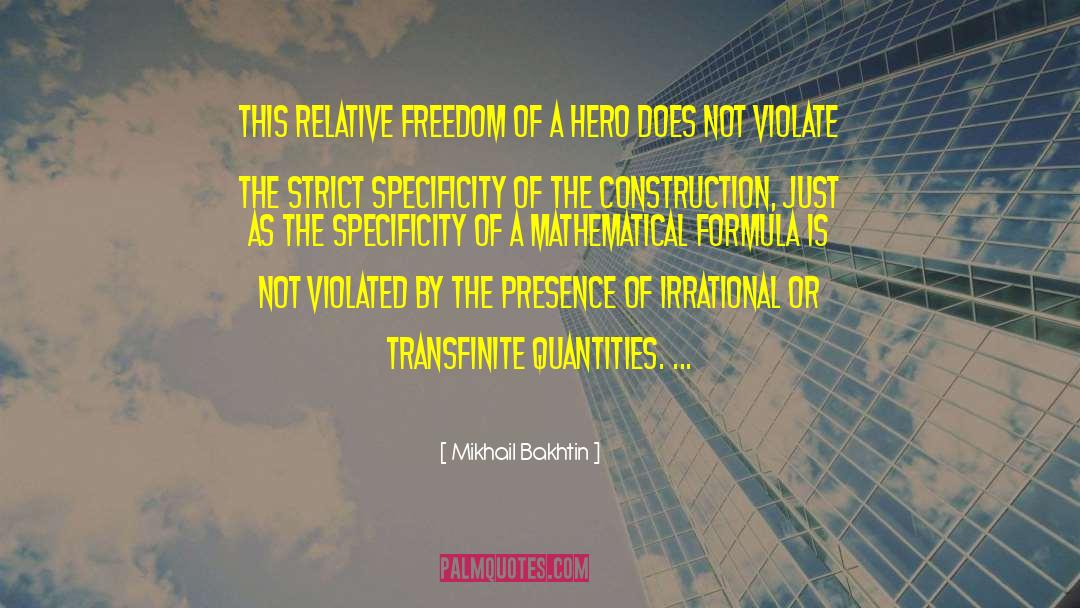
As a result of the work done by all these stratifying force in language, there are no "neutral" words and forms - words and forms that can belong to "no one"; language has been completely taken over, shot through with intentions and accents. For any individual consciousness living in it, language is not an abstract system of normative forms, but rather a concrete heteroglot conception of the world. All words have the "taste" of a profession, a genre, a tendency, a party, a particular work, a particular person, a generation, an age group, the day and hour. Each word tastes of the context and contexts in which it has lived it socially charged life; all words and forms are populated by intentions. Contextual overtones (generic, tendentious, individualistic) are inevitable in the word.
As a living, socio-ideological concrete thing, as heteroglot opinion, language, for the individual consciousness, lies on the borderline between oneself and the other. The word in language is half someone else's. It becomes "one's own" only when the speaker populates it with his own intention, his own accent, when he appropriates the word, adapting it to his own semantic and expressive intention. Prior to this moment of appropriation, the word does not exist in a neutral and impersonal language (it is not, after all, out of a dictionary that the speaker gets his words!), but rather it exists in other people's mouths, in other people's contexts, serving other people's intentions: it is f
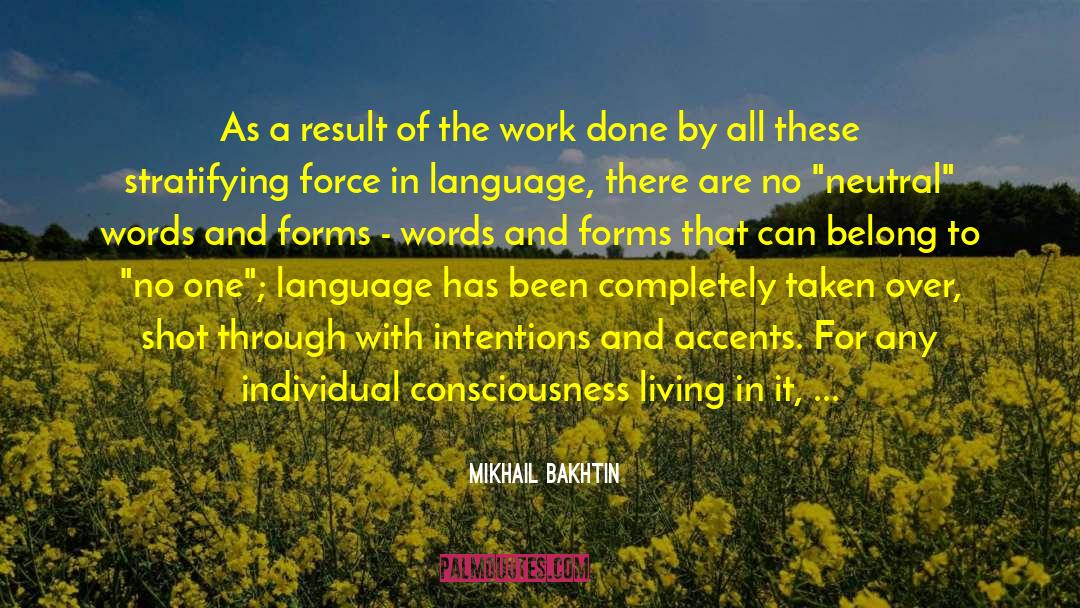
Where there is no passage of time there is also no moment of time, in the full and most essential meaning of the word. If taken outside its relationship to past and future, the present loses its integrity, breaks down into isolated phenomena and objects, making of them a mere abstract conglomeration.
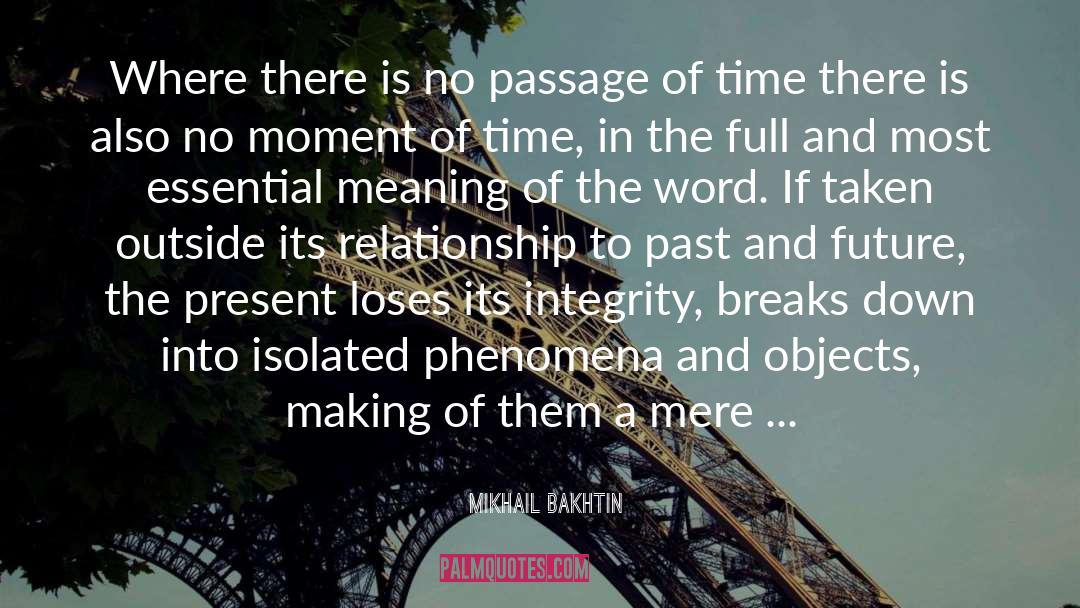
The fundamental category in Dostoevsky's mode of artistic visualizing was not evolution, but coexistence and interaction. He saw and conceived his world primarily in terms of space, not time.
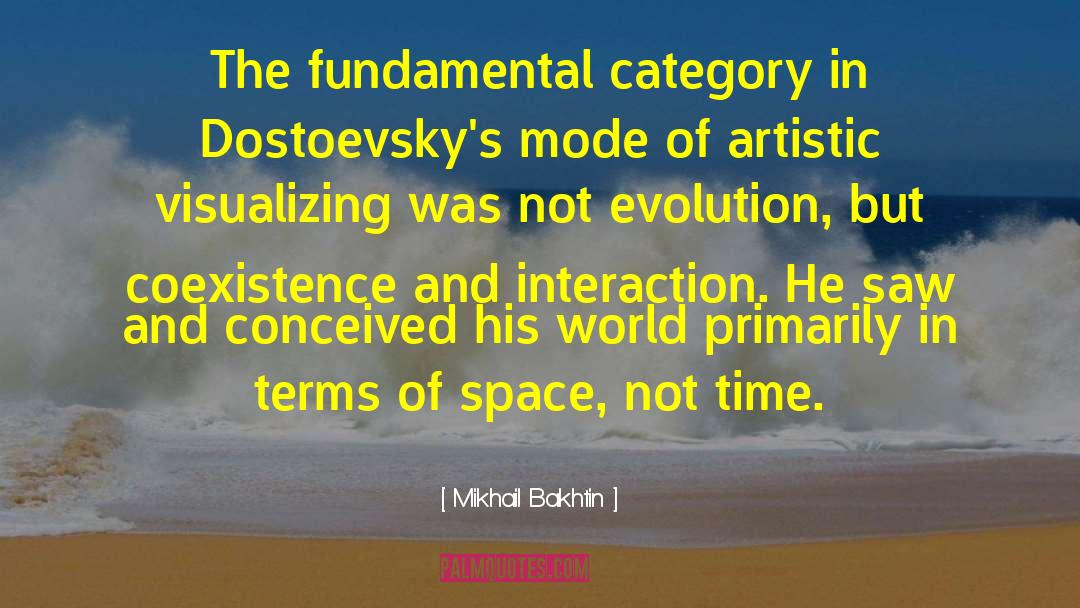
Each novel presents an opposition, which is never canceled out dialectically, of many consciousnesses, and they do not merge in the unity of an evolving spirit, just as souls and spirits do not merge in the formally polyphonic world of Dante.
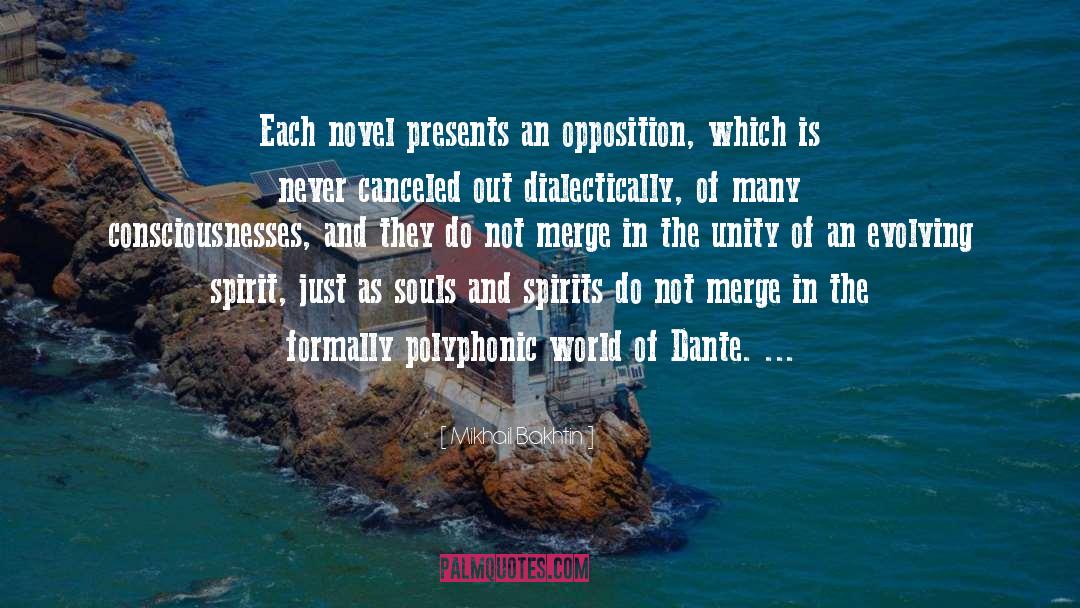
Carnival is past millennia's way of sensing the world as one great communal performance. This sense of the world, liberating one from fear, bringing the world maximally close to a person and bringing one person maximally close to another (everything is drawn into the zone of free familiar contact), with its joy at change and its joyful relativity, is opposed to that one-sided and gloomy official seriousness which is dogmatic and hostile to evolution and change, which seeks to absolutize a given condition of existence or a given social order. From precisely that sort of seriousness did the carnival sense of the world liberate man.
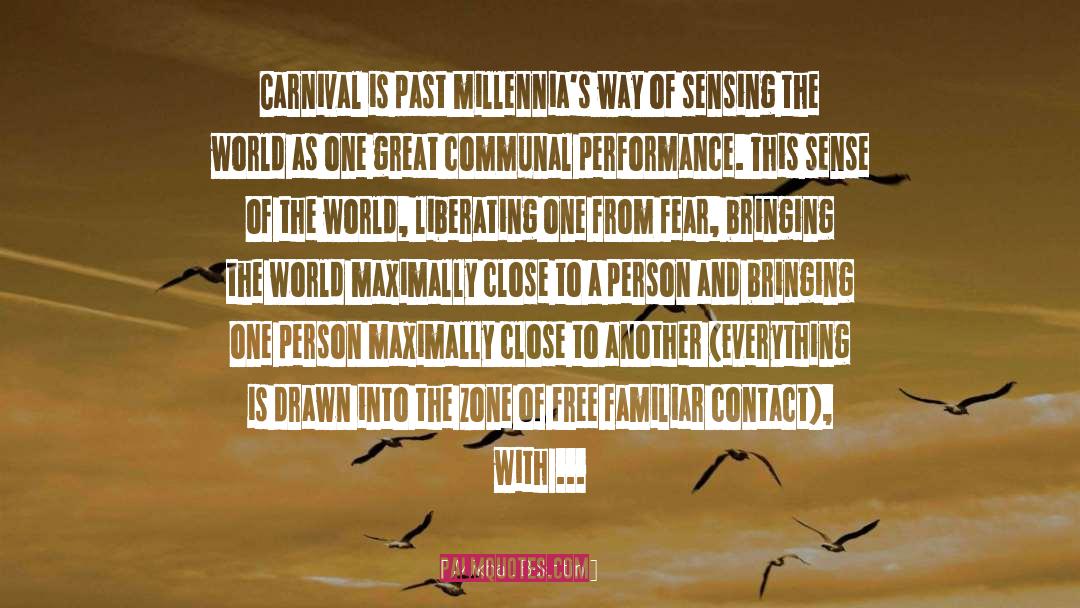
If the novelist loses touch with this linguistic ground of prose style, if he is unable to attain the heights of a relativized, Galilean linguistic consciousness, if he is deaf to organic double-voicedness and to the internal dialogization of living and evolving discourse, then he will never comprehend, or even realize, the actual possibilities and tasks of the novel as a genre. He may, of course, crete an artistic work that compositionally and thematically will be similar to a novel, will be "made" exactly as a novel is made, but he will not thereby have created a novel. The style will always give him away. We will recognize the naively self-confident or obtusely stubborn unity of a smooth, pure single-voiced language (perhaps accompanied by a primitive, artificial, worked-up double-voicedness). We quickly sense that such an author finds it easy to purge his work of speech diversity: he simply does not listen to the fundamental heteroglossia inherent in actual language; he mistakes social overtones, which create the timbres of words, for irritating noises that it is his task to eliminate. The novel, when torn out of authentic linguistic speech diversity, emerges in most cases as a "closet drama," with detailed, fully developed and "artistically worked out" stage directions (it is, of course, bad drama). In such a novel, divested of its language diversity, authorial language inevitably ends up in the awkward and absurd position of the language of stage directions in plays [32

It is given to all of Dostoevsky's characters to "think and seek higher things"; in each of them there is a "great and unresolved thought"; all of them must, before all else, "get a thought straight." And in this resolution of a thought (an idea) lies their entire real life and their own personal unfinalizability. If
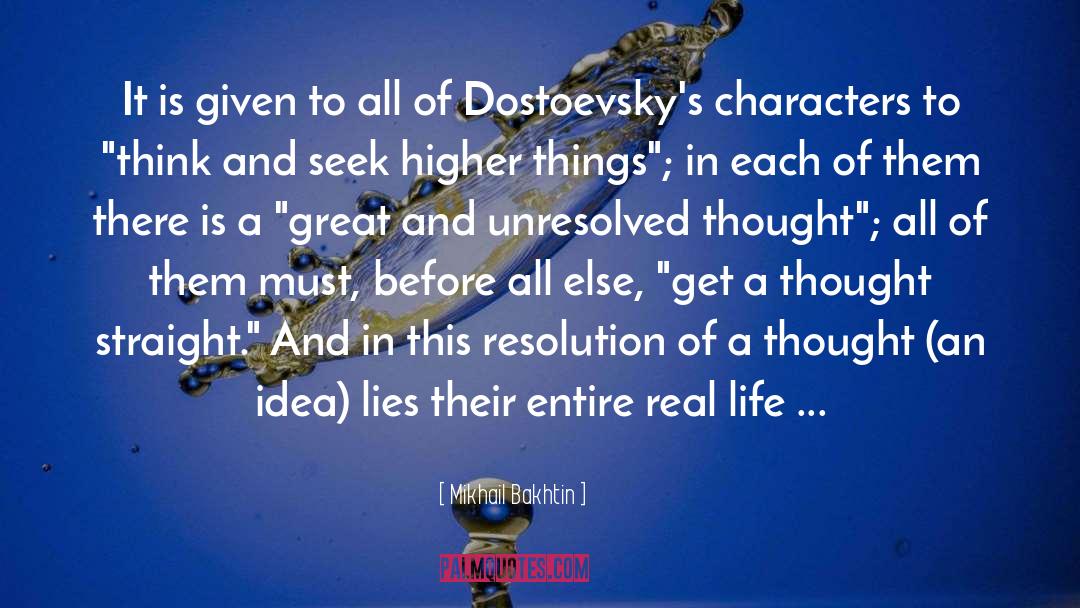
everything resulting from socio-hierarchical inequality or any other form of inequality among people (including age). All distance between people is suspended, and a special carnival category goes into effect: free and familiar contact among people.
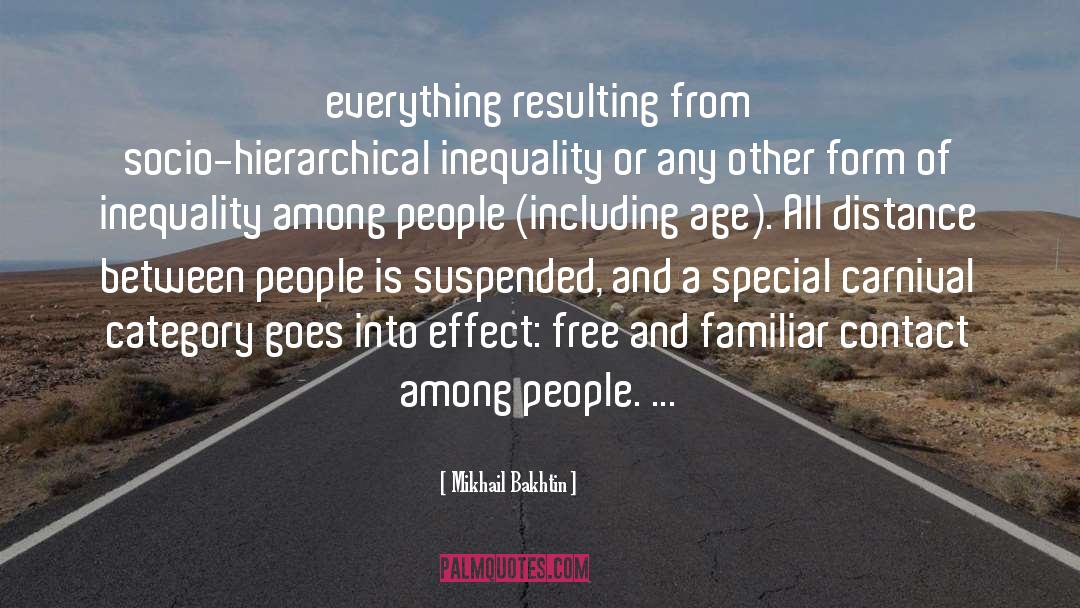
According to Dostoevsky, all is simultaneous, everything coexists. That which has meaning only as "earlier" or "later," which is sufficient only unto its own moment, which is valid only as past, or as future, or as present in relation to past or future, is for him nonessential and is not incorporated into his world. That is why his characters remember nothing, they have no biography in the sense of something past and fully experienced. They remember from their own past only that which has not ceased to be present for them, that which is still experienced by them as the present: an unexpiated sin, a crime, an unforgiven insult.
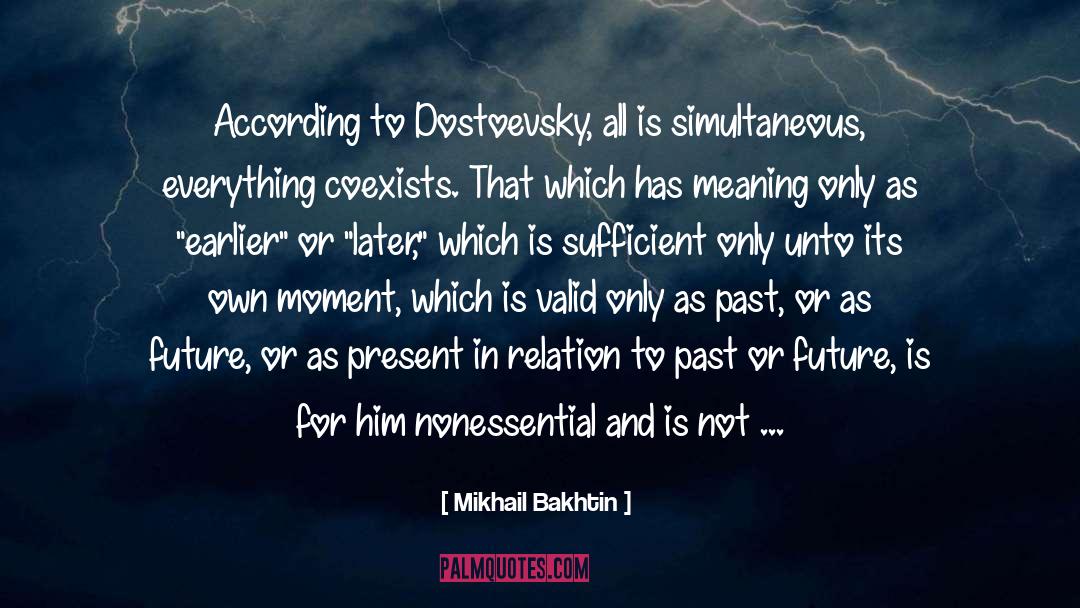
The movement of time is guaranteed by the birth of generation after generation, a never-ending succession that fills the gods with fear.
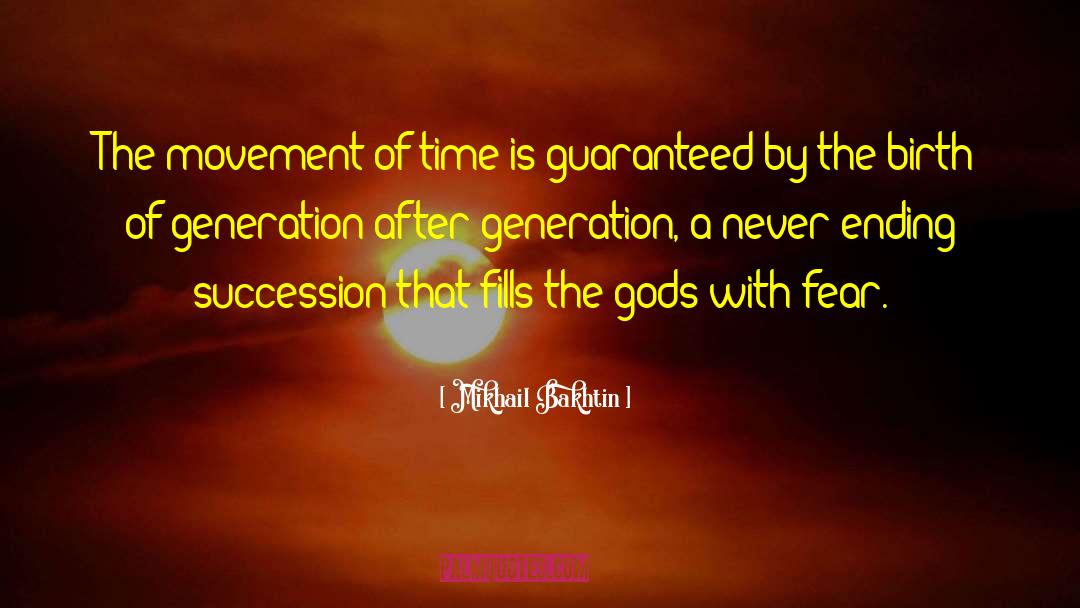
Carnivalization is not an external and immobile schema which is imposed upon ready-made content; it is, rather, an extraordinarily flexible form of artistic visualization, a peculiar sort of heuristic principle making possible the discovery of new and as yet unseen things. By relativizing all that was externally stable, set and ready-made, carnivalization with its pathos of change and renewal permitted Dostoevsky to penetrate into the deepest layers of man and human relationships.
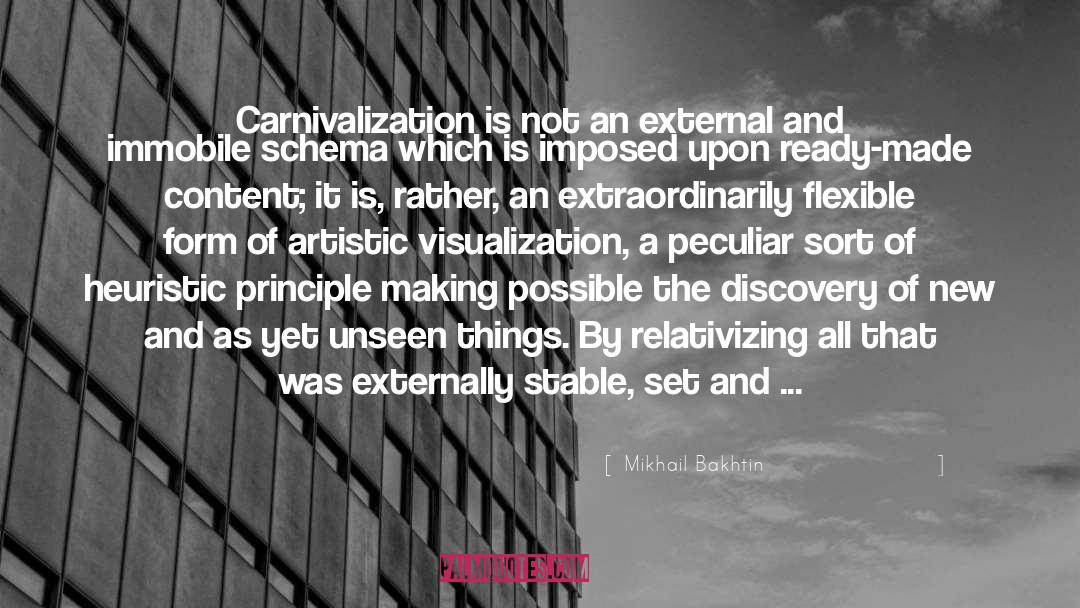
Nothing is absolutely dead: every meaning will have its homecoming festival.

There were quotations that were openly and reverently emphasized as such, or that were half-hidden, completely hidden, half-conscious, unconscious, correct, intentionally distorted, unintentionally distorted, deliberately reinterpreted and so forth. The boundary lines between someone else's speech and one's own speech were flexible, ambiguous, often deliberately distorted and confused. Certain types of text were constructed like mosaics out of the texts of others.
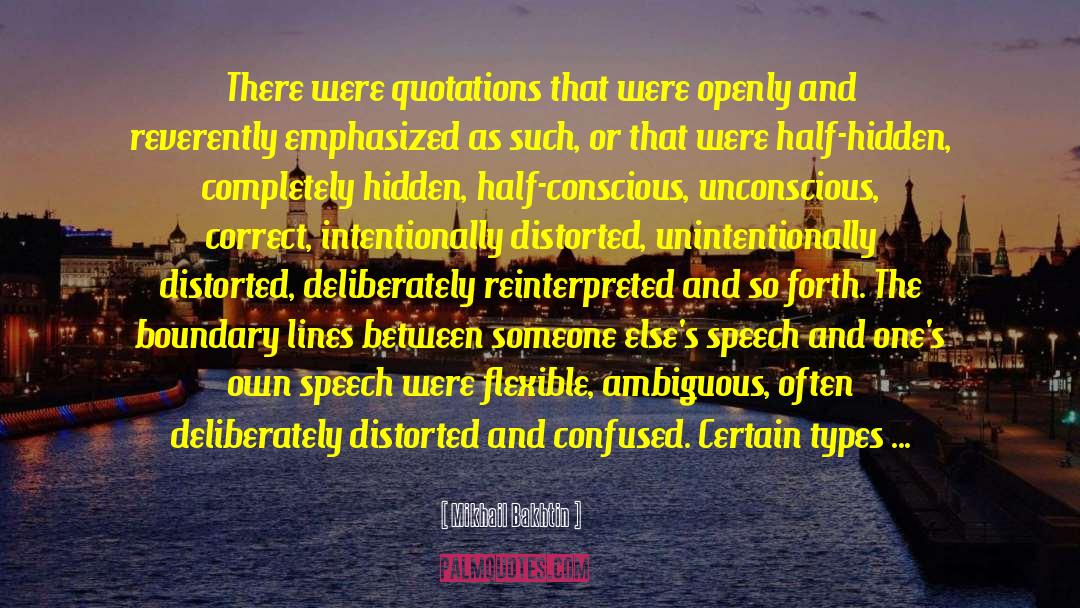
The novel has become the leading hero in the drama of literary development in our time precisely because it best of all reflects the tendencies of a new world still in the making; it is, after all, the only genre born of this new world and in total affinity with it.
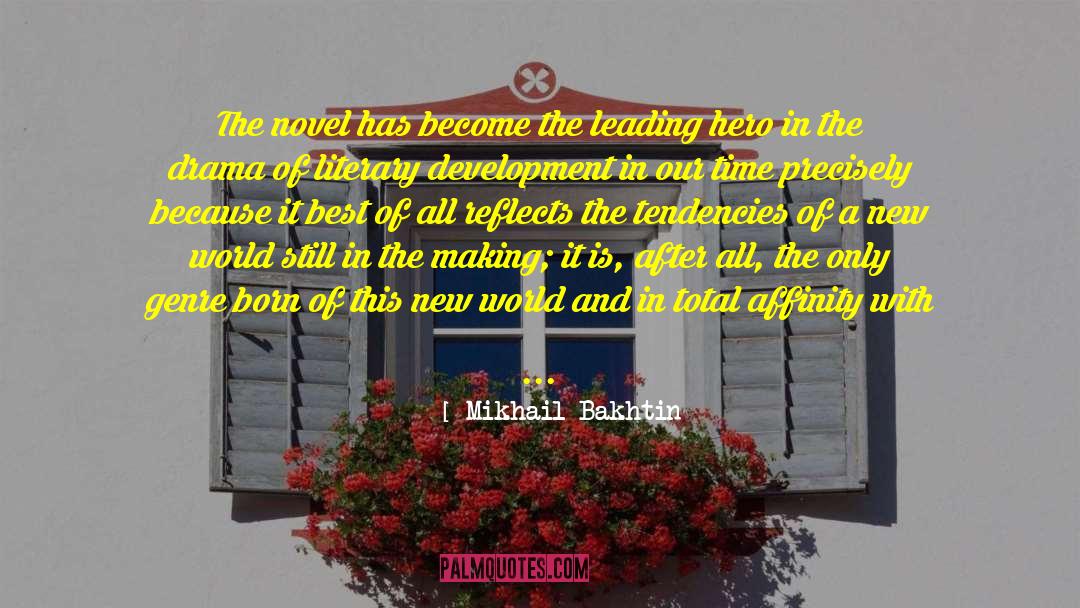
The themes of metamorphosis (transformation-particularly
human transformation-and identity (particularly human identity) are drawn from the treasury of pre-class world folklore. The folkloric image of man is intimately bound up with transformation and identity. This combination may be seen with particular clarity in the popular folktale )skazkaj. The folktale image of man-throughout the extraordinary variety of folkloric narratives-always orders itself around the motifs of transformation and identity (no matter how varied in its turn the concrete expression of these motifs might be).
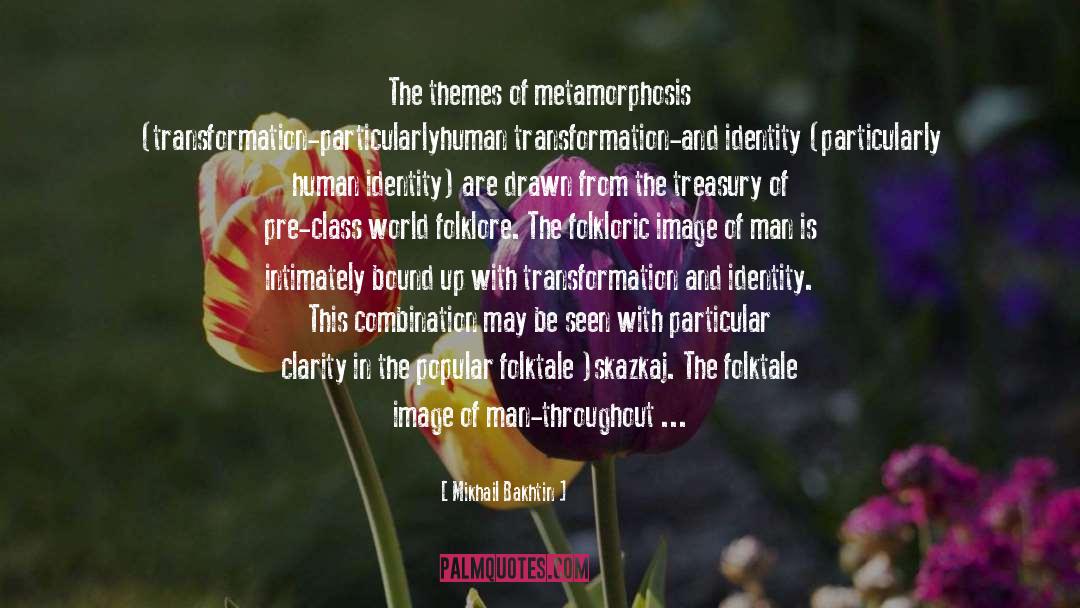
The events of my birth...and finally of my death are not accomplished in me or for me. The affective weight of my life as a whole does not exist for me. Only the Other is in possession of the values of the being of a given person.

Yet people and things have gone through something, something that did not, indeed, change them but that did (in a manner of speaking) affirm what they, and precisely they, were as individuals, something that did verify and establish
their identity, their durability and continuity. The hammer of events shatters nothing and forges nothing-it merely tries the durability of an already finished product. And the product passes the test. Thus is constituted the artistic and ideological meaning of the Greek romance.

In poetry, even discourse about doubts must be cast in a discourse that cannot be doubted.

All words have the "taste" of a profession, a genre, a tendency, a party, a particular work, a particular person, a generation, an age group, the day and hour. Each word tastes of the context and contexts in which it has lived its socially charged life ...
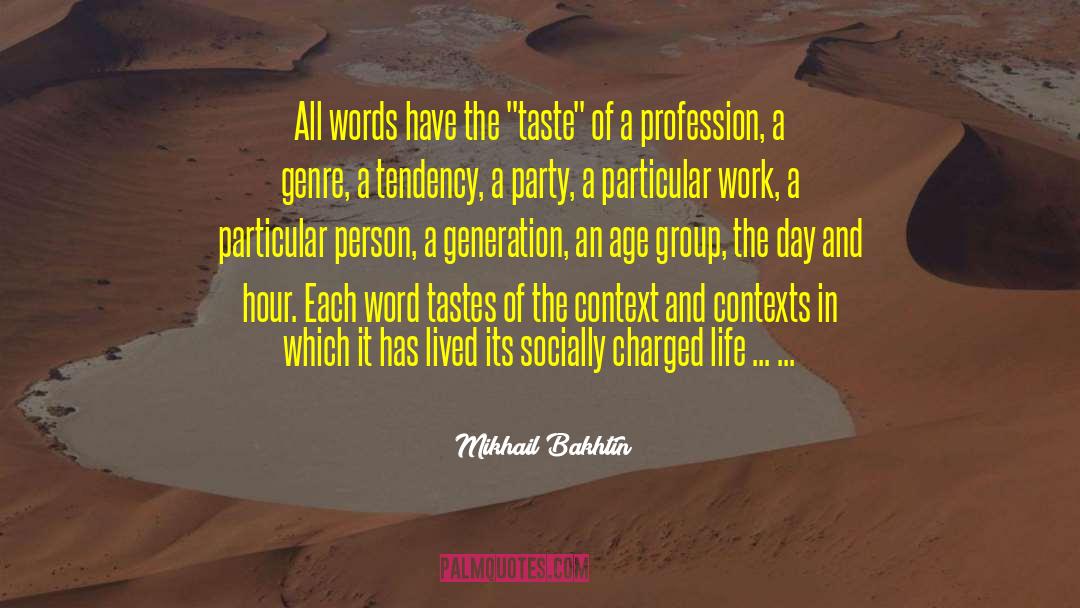
This is a profoundly universal laughter, a laughter that contains a whole outlook on the world.
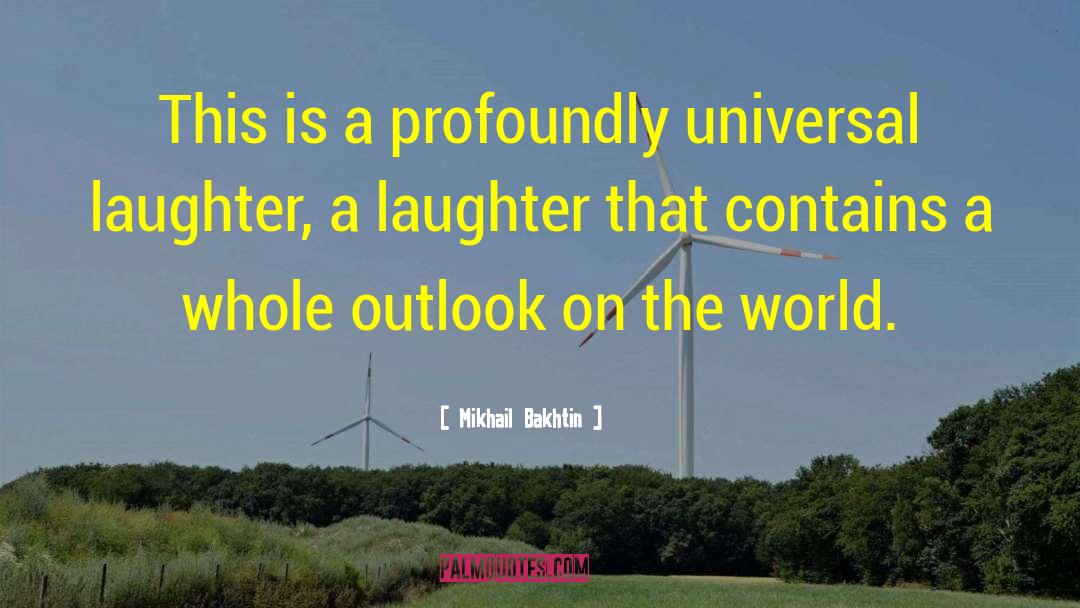
Dostoevsky's hero is not only a discourse about himself and his immediate environment, but also a discourse about the world; he is not only cognizant, but an ideologist as well. The
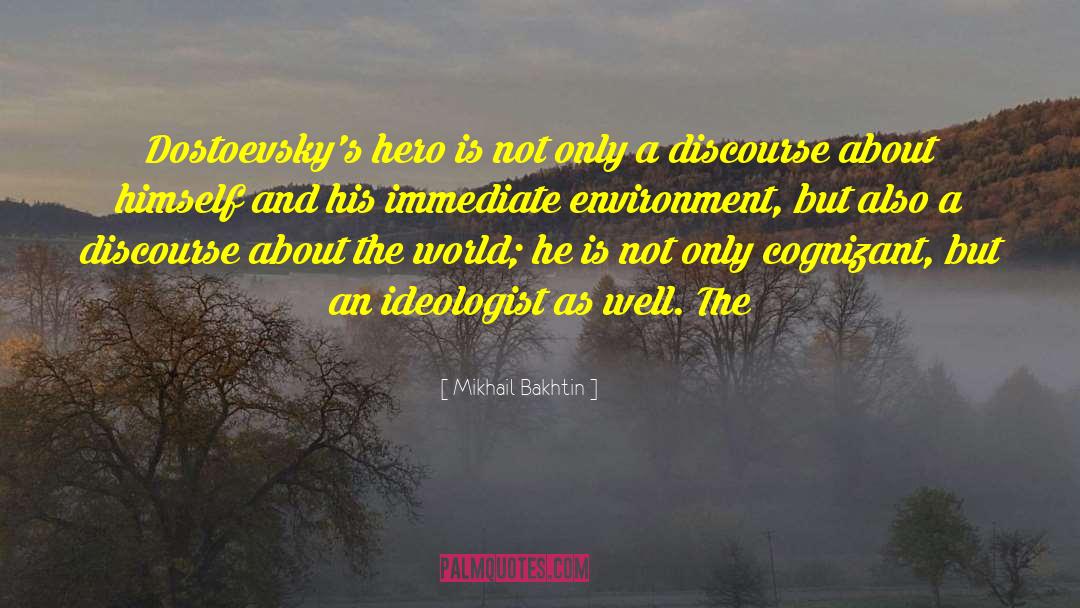
For him, to get one's bearings on the world meant to conceive all its contents as simultaneous, and to guess at their interrelationships in the cross-section of a single moment. This
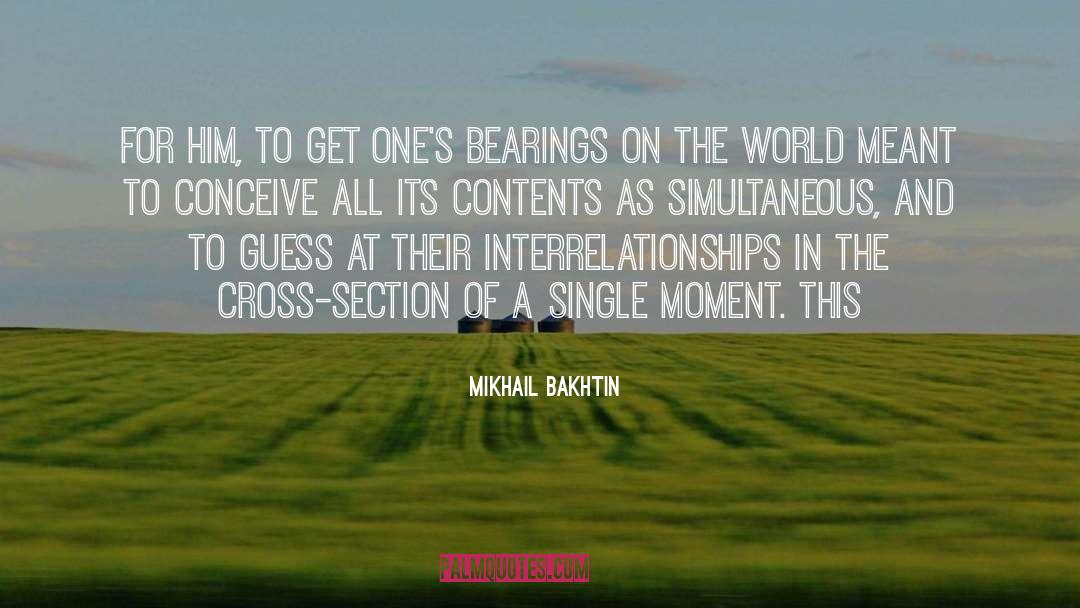
fundamentally distinguish the novel in principle from other genres: (i) its stylistic three-dimensionality, which is linked with the multi-languaged consciousness realized in the novel; (2) the radical change it effects in the temporal coordinates of the literary image; (3) the new zone opened by the novel for structuring literary images, namely, the zone of maximal contact with the present (with contemporary reality) in all its openendedness.
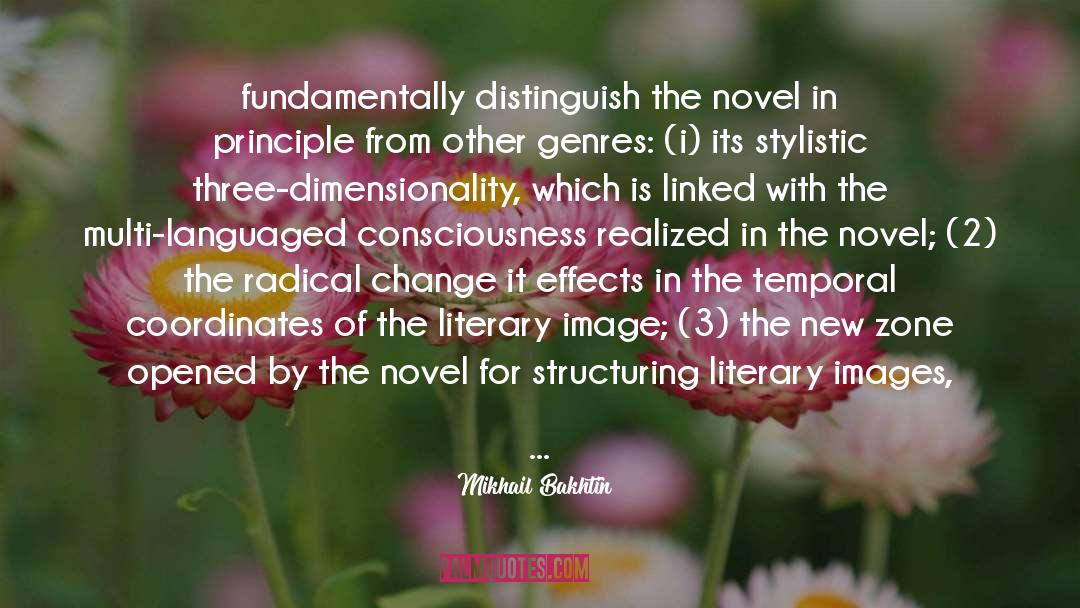
The essence of polyphony lies precisely in the fact that the voices remain independent and, as such, are combined in a unity of a higher order than in homophony.
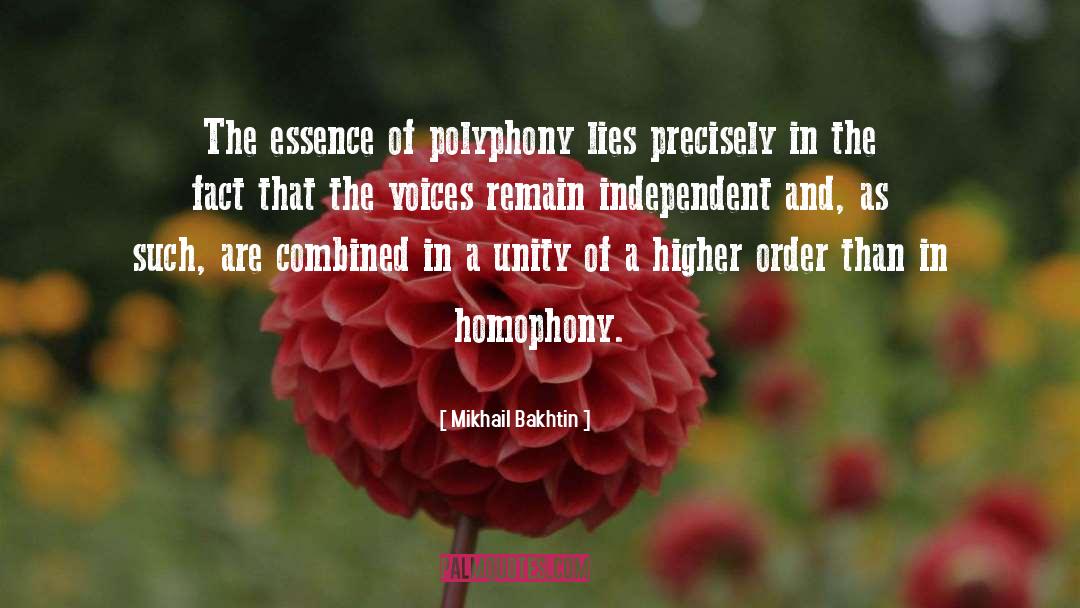
I find three basic characteristics that fundamentally distinguish the novel in principle from other genres: (i) its stylistic three-dimensionality, which is linked with the multi-languaged consciousness realized in the novel; (2) the radical change it effects in the temporal coordinates of the literary image; (3) the new zone opened by the novel for structuring literary images, namely, the zone of maximal contact with the present (with contemporary reality) in all its openendedness.
These three characteristics of the novel are all organically interrelated and have all been powerfully affected by a very specific rupture in the history of European civilization: its emergence from a socially isolated and culturally deaf semipatriarchal society, and its entrance into international and interlingual contacts and relationships.
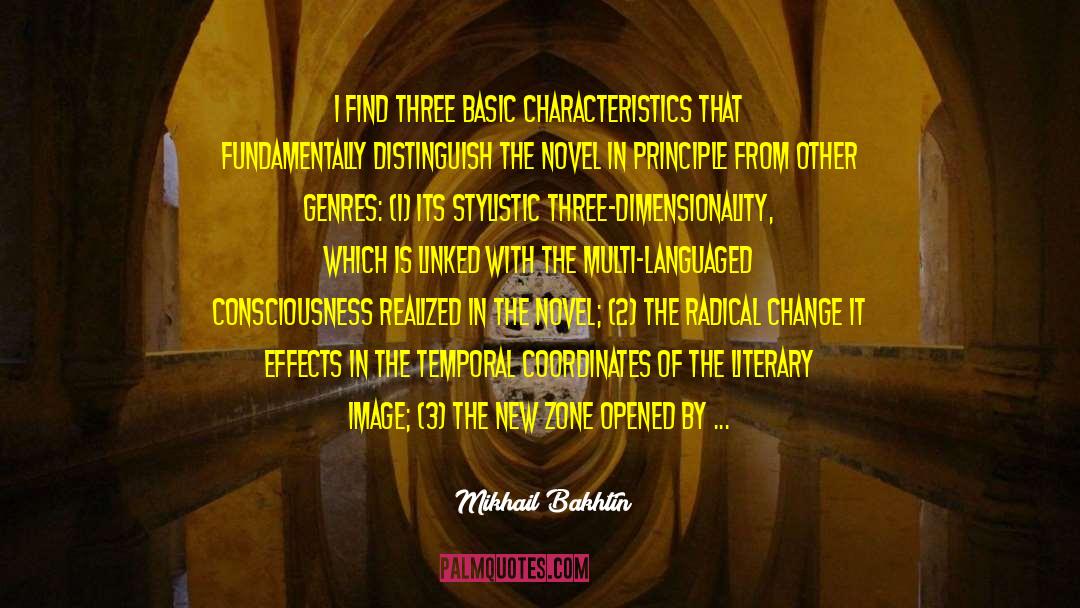
That accents of the hero's self-consciousness are really objectified and that the work itself observes a distance between the hero and the author. If the umbilical cord uniting the hero to his creator is not cut, then what we have is not a work of art but a personal document. Dostoevsky's

Prophecy is characteristic for the epic, prediction for the novel.

For the prose artist the world is full of other people's words, among which he must orient himself and whose speech characteristics he must be able to perceive with a very keen ear. He must introduce them into the plane of his own discourse, but in such a way that this plane is not destroyed.
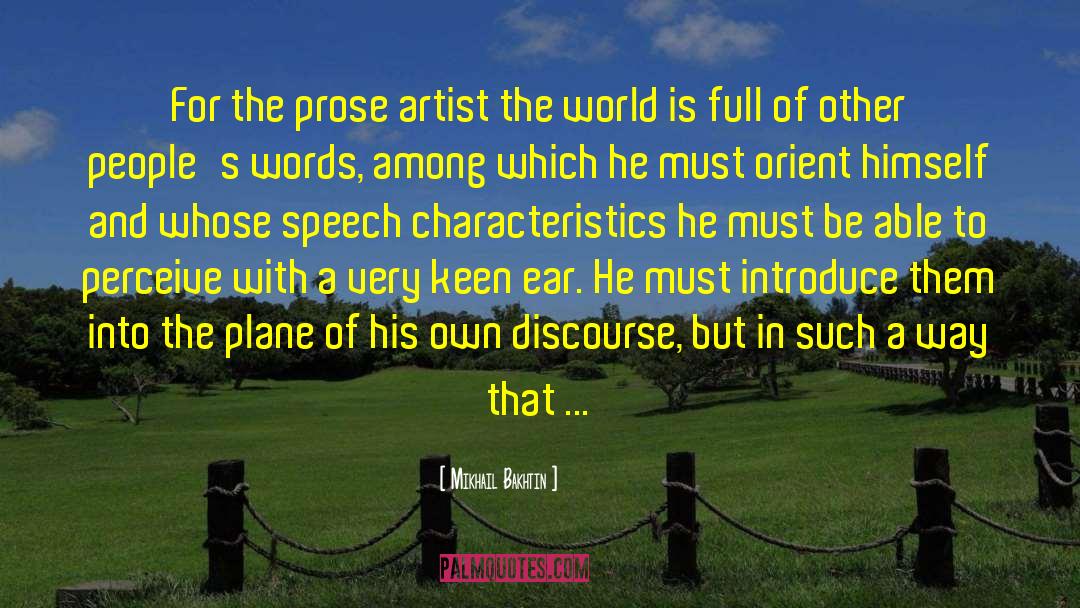
To think about them means to talk with them; otherwise they immediately turn to us their objectivized side: they fall silent, close up, and congeal into finished, objectivized images.
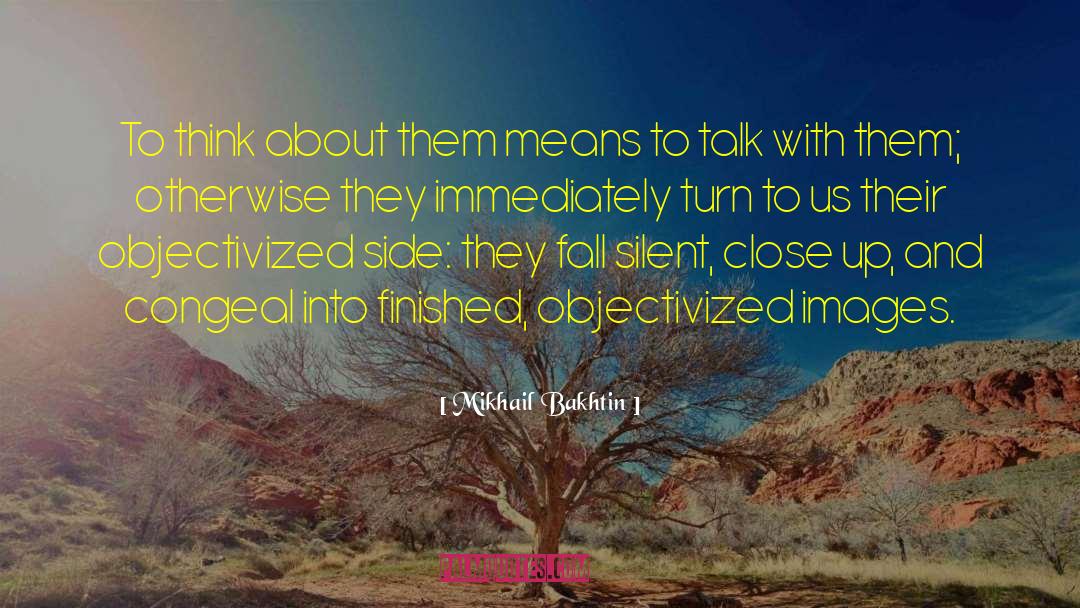
Discourse about the world merges with confessional discourse about oneself.

But in fact Dostoevsky found and was capable of perceiving multi-leveledness and contradictoriness not in the spirit, but in the objective social world. In this social world, planes were not stages but opposing camps, and the contradictory relationships among them were not the rising or descending course of an individual personality, but the condition of society. The multi-leveledness and contradictoriness of social reality was present as an objective fact of the epoch. The
